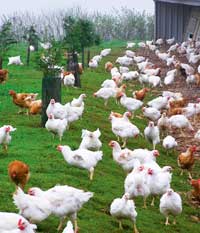Over-supply threatens high-welfare egg market

Sales of high welfare eggs have jumped, despite the recession, but the industry’s rapid expansion may soon need to be checked as the threat of an oversupply looms.
Free-range eggs sales, by volume, rose to 53% of the market from March 2009 to March 2010, up from 47% the year before. Cage egg sales dropped accordingly.
The increase in consumption has not seen a significant rise in prices paid to producers, however, with levels hovering around 88-92p/doz during 2009.
John Retson, chairman of the British Free Range Egg Producers Association, attributed growth in the sector to a shortage of cage eggs coupled with demand from consumers and food manufacturers for higher welfare eggs.
“Cage eggs are scare because they are under conversion to colony systems,” he said. “The main reason, however, is that the consumer wants a more welfare friendly product which free range can offer. Also, the liquid egg market is taking more and more free-range eggs.”
Mr Retson said that, while there is still room to grow the industry, the limit for expansion is approaching. “The level of interest at the moment is not sustainable,” he said.
This view was endorsed by NFU poultry board chairman Charles Bourns, who said the current market for free-range eggs was being distorted by the upcoming ban on conventional cages in 2012.
“We’re in a total state of flux for the next 18 months,” he told Poultry World. “Germany has already brought in their ban, so we are exporting eggs to Germany and this is supporting the market. But by the middle of next year Germany is going to have more egg hens than they have had in their lifetime.”
In addition, there were many arable farmers, armed with single farm payment money, looking to get into free-range egg production. “This is a situation the industry is trying to manage but there is a real danger the industry in under threat of being overdone.”
John Bowler of John Bowler Eggs, which operates a franchise system for producers wanting to enter the market, said the industry should focus on maintaining stability.
“When you’re trying to supply a great demand you get periods of oversupply ,but it is the degree of oversupply that is the problem,” Mr Bowler said. “We always endeavour to ensure stability for existing producers and that should be the priority.”
• Sales of welfare-friendly chicken meat have also soared in the past 12 months, with the Freedom Foods sales increasing from £16m to £72m. Freedom Foods chief executive Leigh Grant said this was “absolute proof that chicken welfare is of paramount importance to more people than ever before”.
But the NFU believes the increase in Freedom Food sales is mainly due to a ‘downshift’ by producers from more expensive production methods such as organic or free range. Standard chicken sales still top £1.1bn.
• For comment – and to add you views – on this and other hot agribusiness issues visit Phil Clarke’s Business Blog
